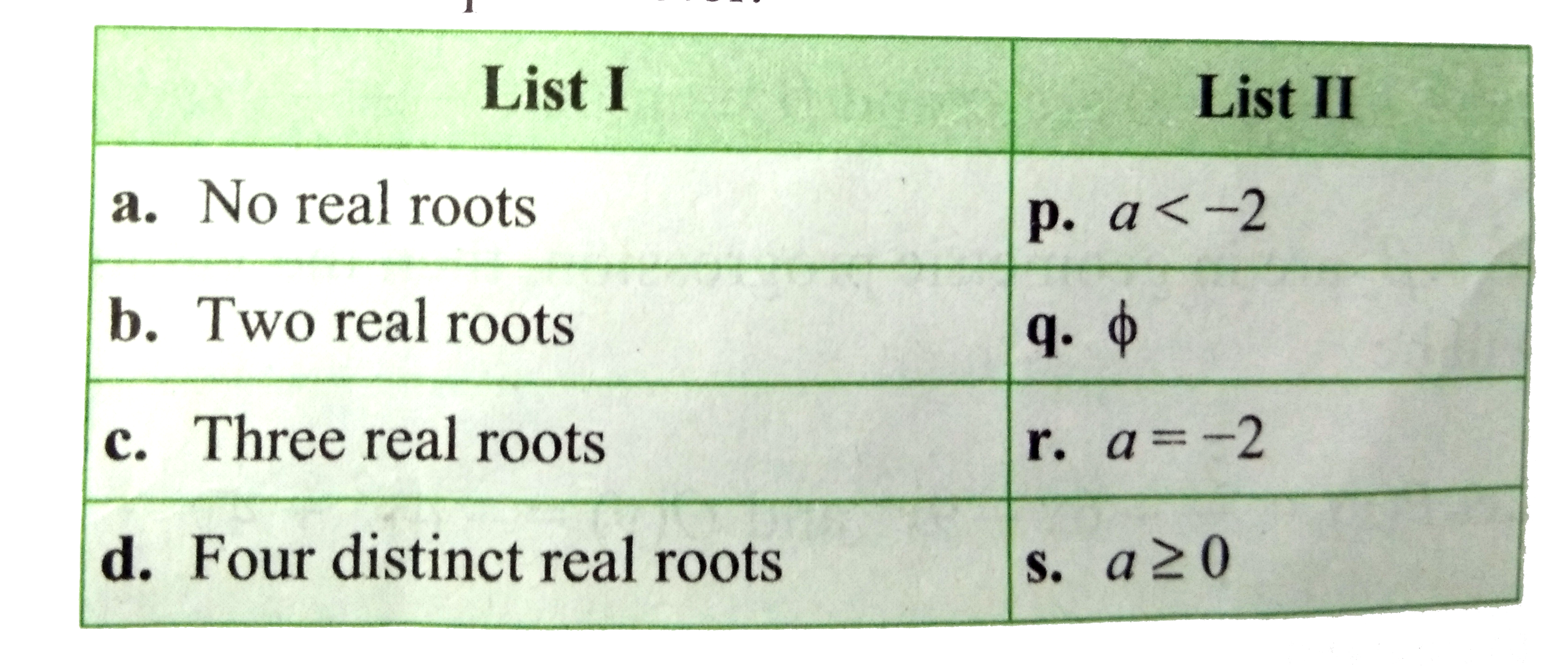Let three quadratic equations ax2−2bx+c=0,bx2−2cx+a=0
and cx2−ax+b=0, all have only positive roots. Then ltbr> Which of these are always ture? Solution in Tamil
b2=ac
c2=ab
each pair of equations has exactly one root common
each pair of equations has two roots common
The correct Answer is:1,2,4
For each equation , required condition
(i) Dicriminant ≥0⇒b2≤ac,c2≥ab,a2≥bc
(ii) f(0)>0⇒c,a,b≥0
(iii) Abscissa of vertex >0⇒ba>0,cb>0,ac>0 .
Now, b2ac,c2≥ab⇒b2c2≥a2bc⇒bc≥a2.
But a2≥bc.So,a2=bc
Similarly, b2=acandc2=ab
Therefore , a = b= c .
Topper's Solved these Questions
- THEORY OF EQUATIONSBOOK - CENGAGECHAPTER - THEORY OF EQUATIONSEXERCISE - Exercise (Comprehension)
37 Videos
- THEORY OF EQUATIONSBOOK - CENGAGECHAPTER - THEORY OF EQUATIONSEXERCISE - Exercise (Matrix)
6 Videos
- THEORY OF EQUATIONSBOOK - CENGAGECHAPTER - THEORY OF EQUATIONSEXERCISE - Exercise (Single)
89 Videos
- STRAIGHT LINESBOOK - CENGAGECHAPTER - STRAIGHT LINESEXERCISE - JEE Advanced Previous Year
4 Videos
- THREE DIMENSIONAL GEOMETRYBOOK - CENGAGECHAPTER - THREE DIMENSIONAL GEOMETRYEXERCISE - Question Bank
12 Videos
Similar Questions
Consider an unknow polynomial which divided by (x−3) and (x−4) leaves remainder 2 and 1, respectively. Let R(x) be the remainder when this polynomial is divided by (x−3)(x−4).
If equations R(x)=x2+ax+1 has two distint real roots, then exhaustive values of a are.
View SolutionMatch the following for the equation x2+a|x|+1=0 where, a is a parameter.

View SolutionThe value of expression x4−8x3+18x2−8x+2 when x=2+√3
View Solutionabout to only mathematics
View SolutionThe equation of the plane which has the property that the point Q(5,4,5) is the reflection of point P(1,2,3) through that plane, is ax+by+cz=d where a,b,c,d∈N. Find the least value of (a+b+c+d).
View SolutionIf the equations ax^(2)-2bx+c=0,bx^(2)-2cx+a=0 and cx^(2)-2ax+b=0 all have only positive roots,then
View SolutionIf the roots of ax3+bx2+cx+d=0 are in A.P. then the roots of dx3+cx2+bx+a=0 are in
View SolutionIf the quadratic equations ax^(2)+cx-b=0 and ax^(2)-2bx+(c)/(2)=0,(b+(c)/(2)!=0) have a common root,then the value of a-4b+2c is
View SolutionIf the roots of ax3+bx2+cx+d=0 are in H.P. then the roots of dx3−cx2+bx−a=0 are in
View SolutionIf alpha,beta are the roots of equation ax^(2)+bx+c=0, then what are the roots of equation cx^(2)-bx+a=0
View SolutionIf a, b, c are positive real numbers such that the equations ax2+bx+c=0andbx2+cx+a=0, have a common root, then
View SolutionIfαandβ are the roots of the equation ax2+bx+c=0, then what are the roots of the equation cx2+bx+a=0 ?
View SolutionIf the roots of ax3+bx2+cx+d=0 are in A.P then the roots of dx3+cx2+bx+a=0 are in
View SolutionIf the roots of ax3+bx2+cx+d=0 are in H.P then the roots of dx3−cx2+bx−a=0 are in
View SolutionIf the roots of ax3+bx2+cx+d=0 are in G.P then the roots of dx3−cx2+bx−a=0 are in
View SolutionThe product of the roots of the quadratic equation ax2+cx+b=0 is ______.
View Solution
